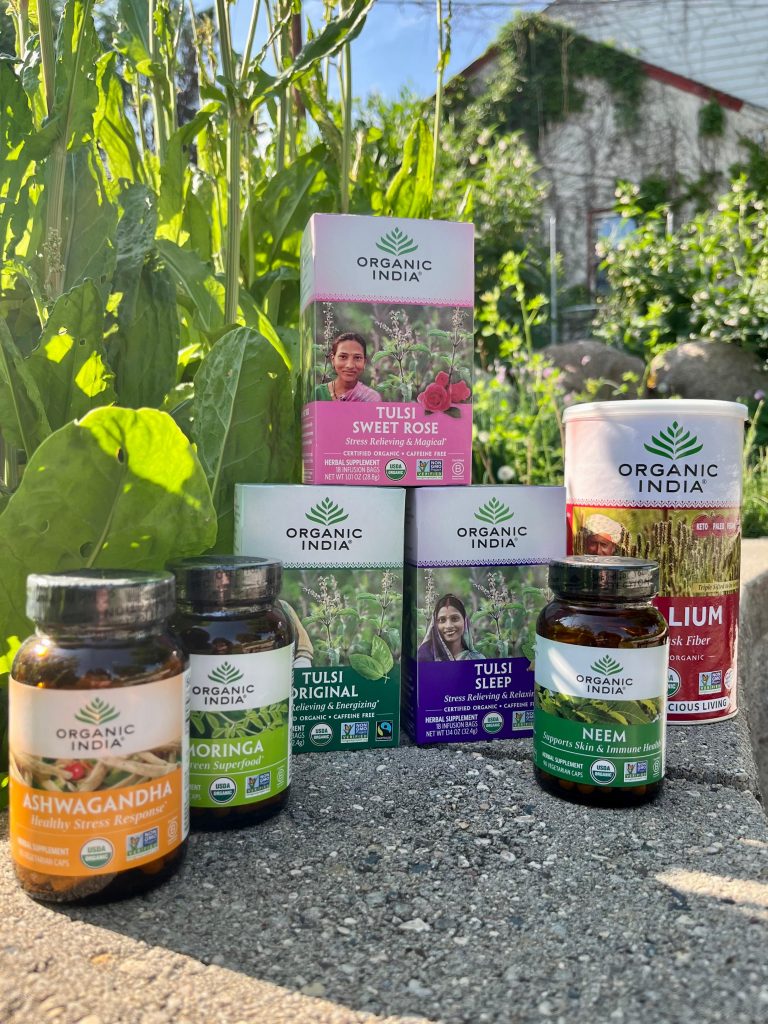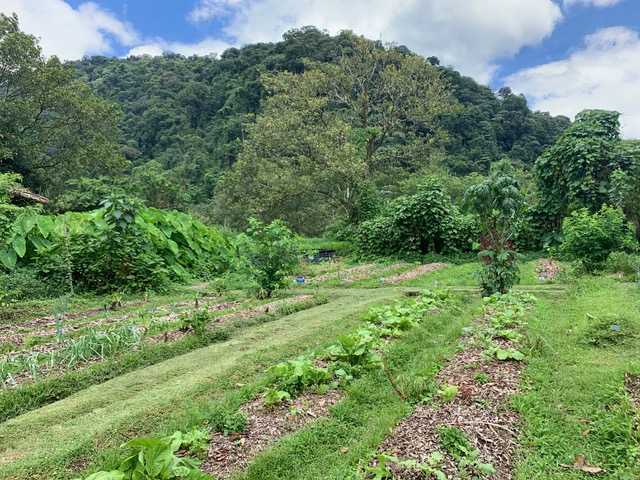In the 1960s and 70s, a new way of farming named the “Green Revolution” was introduced to India to help feed its growing population. This new form of agriculture abandoned traditional farming methods used in India for thousands of years and introduced a Western, specifically American, way to farm. These new methods introduced chemicals and pesticides, intensive irrigation, and genetically-modified high-yield seeds. At first, India and its farmers benefited from these changes. But as the decades wore on, the actual consequences of this way of farming became a horrible burden, locking Indian farmers into debts they will never be able to repay, and in unfortunate circumstances leading to a dramatic increase in Indian farmer suicide.
Flash forward to the 1990s in Lucknow, India, when the founders of Organic India Bharat Mitra and Bhavani Lev bore witness to the devastation caused by the attempt to industrialize Indian farmers. At the same time, they learned about a traditional herb known as Tulsi, or Holy Basil. Tulsi is an adaptogenic herb from the mint family. It is native to the Indian subcontinent with numerous health benefits, including immune-modulating phytochemicals. Its adaptogenic properties may assist the body’s response to physical, environmental, and mental stress. Ayurveda involves the use of many herbs, with Tulsi considered to be the herb of the highest status. Known as “The Incomparable One” or “The Queen of Herbs,” Tulsi is used in spiritual rituals and everyday practice.

Western medicine researching Tulsi’s properties found it to be pharmacologically significant as an antimicrobial, which includes antiviral, antibacterial, antifungal, and antimalarial. Laboratory studies show Tulsi increases the body’s antioxidant properties, such as glutathione and enzymatic actions. Using Tulsi lessens the adverse effects of daily exposure to environmental toxins and heavy metals. As with many traditional herbs, Tulsi remains a mainstay of Ayurvedic practice due to its long history of beneficial outcomes.
Organic India’s founders felt compelled to take action. They began their mission to bring Tulsi and other adaptogenic and traditional herbs to the world by partnering with farmers in India to leave behind the detrimental “Green Revolution” farming practices and begin farming in a renewed way. This way would include the goals of Organic India: recover traditional agricultural wisdom, start the environmental regeneration of thousands of acres of farmland and forest, and establish a new business model based on responsible economic, social, and environmental principles and fair-trade-based farmer partnerships.
Partnering with rural Indian farms, Organic India brings organic, bio-regenerative farming practices and ancient crops, such as Tulsi, to the world. Bio-regenerative farming goes beyond organic to heal, restore, and protect the environment. Agriculture does not need to be only one way where humans get as much product as possible from the earth. If done in a bio-regenerative framework, it can work harmoniously to enrich depleted soils, replenish water sources, and bring back our insect pollinator friends.
Organic India established a research farm known as Bhrindavan to recover the lost Vriskha system of farming, the foundation of agriculture in India before the “Green Revolution.” Using a cyclical model, every plant, animal, and insect plays a vital role. The cows consume unused plant material, and in turn, provide manure to fertilize the crops. While insects pollinate the crops, plant species and wild birds can repel and manage pests without harmful chemicals.
You’ll find Organic India’s extensive tea, supplement, and fiber lines at quality health food stores. Tulsi remains their foundational herb, and their teas all contain it at their heart. Varieties of tea include honey chamomile, regenerative rose, and a sleep blend, among others. Western diets often sorely lack fiber, and Organic India features a line of fiber products with unbeatable quality. Available as a powder in a canister, the psyllium whole husk fiber helps maintain healthy elimination and regularity, promotes appetite control, and supports the entire gastrointestinal system. Organic India’s supplements include Ayurvedic herbs, such as neem, ashwagandha, gotu kola, and moringa.
When you purchase Organic India’s supplements, teas, or fibers, you can be assured you are buying a top-quality product while supporting the family farmers in India and positively impacting our earth. Organic India is doing their part to help undo some of the devastating effects of the “Green Revolution.” You can be a part of its mission while bringing good health to yourself and your family.
Alina Hornfeldt is a co-owner of Mastel’s Health Foods in Saint Paul. Since 1968, Mastel’s has been a locally-owned health food store offering a wide selection of supplements, organic snacks, books, home items, functional beverages, THC options, and personal care products. Known for expert knowledge and superior customer service, the store is dedicated to helping customers make informed decisions about their health and wellness.
















